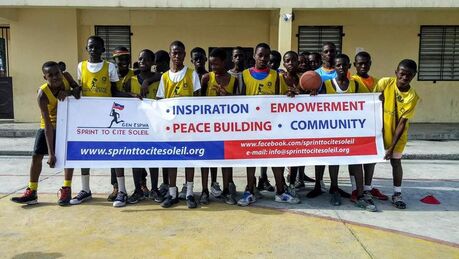Overview

Cite Soleil, Haiti is often recognized for its extreme poverty and gang violence. We and many promising leaders within Cite Soleil believe this can change in time with sustainable, long-term programs for kids and commitment from the community of Cite Soleil. Sprint to Cite Soleil is a critical program towards driving this change. Sprint works with this community to empower, inspire and promote solidarity through 4 specific aspects: basketball, nutrition, community and connection. Sprint's basketball program is the foundation of our program. Every Saturday and Sunday, 160 boys and girls (grades 1-12) from all across the community come to together to train in basketball. This program not only gives kids and young adults a supportive and close knit community, but steers Cite Soleil's next generation off the streets and away from gang affiliation. These kids are all trained weekly by our 10 employed coaches, who also serve as role models. In addition to basketball, Sprint has hired 4 cooks to prepare a nutritious meal for every kid following each Saturday practice. This homemade rice, bean and meat/fish meal is too often the only meal of the day and only reliable source of food for these kids. Outside of our weekly basketball and meal program, Sprint works alongside the community to further support and inspire. In the past, Sprint has led community clean-ups, built Cite Soleil's only standing community basketball court, and so much more. Lastly, Sprint is connected with many national and international organizations and change makers to expand our work and impact upon this community and further. Sprint has supported the build of Cite Soleil's first library, is connected to two Haitian hospitals, a special needs home, orphanages, and other community programs!
Our Mission
Sprint to Cite Soleil works alongside the community of Cite Soleil, Haiti to inspire, empower and create peace.
OUR STORY

Sprint to Cite Soleil was founded in 2016 by two high school sophomores, Sam Shapiro and Jack Moe. In 2013, Sam’s family adopted a 15 year old boy from Cite Soleil Haiti, sparking his interest to learn more about the region. In June of 2015, curious to learn more about where his brother grew up, Sam flew to Cite Soleil for his first time. While visiting and walking through Cite Soleil, he saw so many young children wandering the streets in desperate need of change. One day, as he walked through the neighborhood where his brother had grown up, Sam spotted a run down basketball court. He imagined what it would be like for kids to be able to play basketball on that court, and how athletics could be used as a tool to positively inspire kids and steer them away from violence. This abandoned court is what ultimately sparked the idea of what Sprint to Cite Soleil is today.
Upon returning to America and wanting to help his brothers community, Sam reached out to local Haitian peace leader and the President of Cite Soleil basketball through Facebook. In addition, Sam shared his experience in Haiti with many, including his good friend Jack Moe. Jack became intrigued and asked to learn more. Together they further pondered the possibilities of how to work with the community of Cite Soleil to improve lives. In June of 2016, they made their first trip together to Cite Soleil, where they connected with a range of people and helped organize what the Sprint to Cite Soleil basketball program is today. In July of 2016, Sprint to Cite Soleil became an official 501c3 recognized organization.
What makes us different
Sprint to Cite Soleil knows that by establishing a true partnership with the community, we can help Cite Soleil develop a long term solution. We have noticed that many organizations import food, supplies and more from the US to support their programs in other countries. Although this is a very quick way to create change, communities can become reliant on outside aid, ultimately stunting development. Sprint works to combat this by keeping the sources of our program in Haiti as much as possible. We purchase all of our ingredients for our weekly meal program from local Haitian vendors and hire members in the community if we ever need maintenance or assistance. By keeping our program in Haiti, we can be part of a long term solution and support the Haitian economy and people to our fullest extent.
